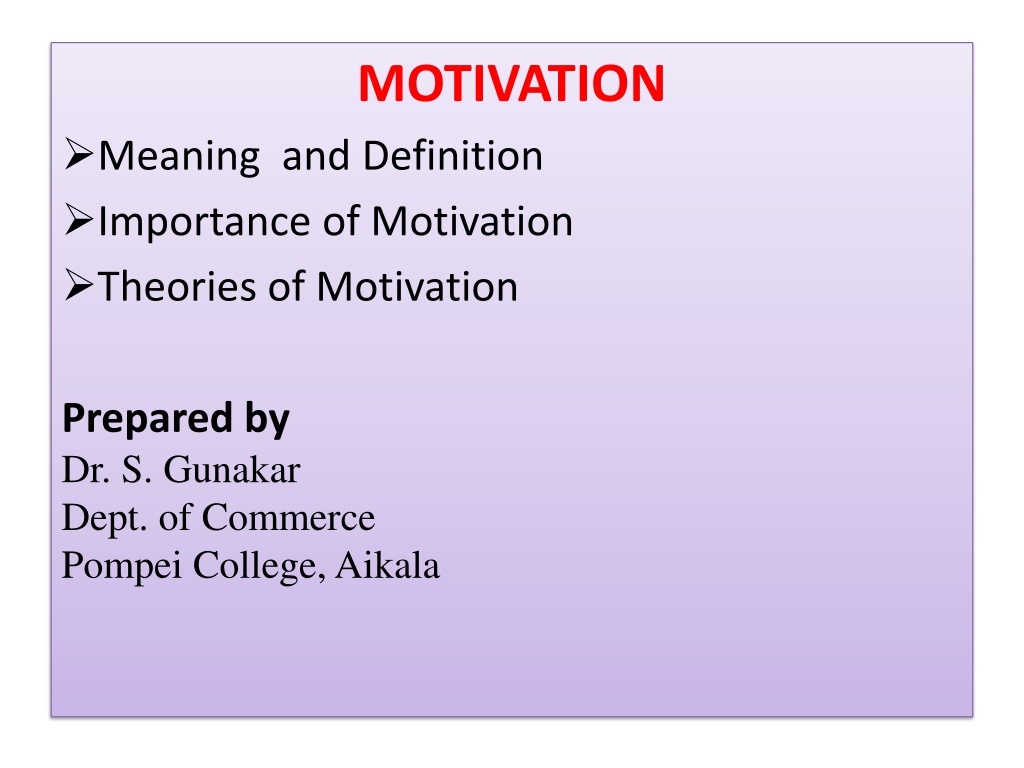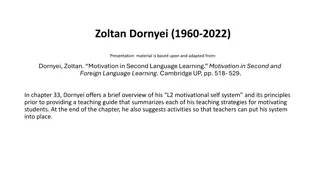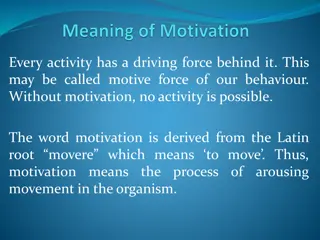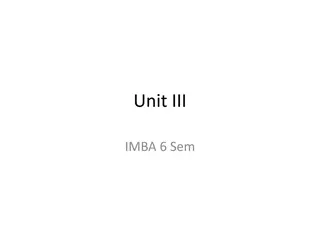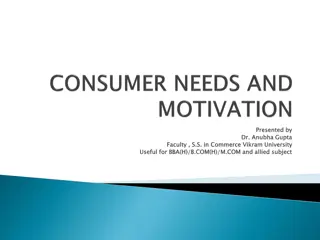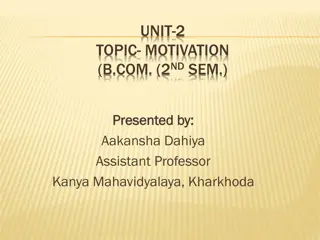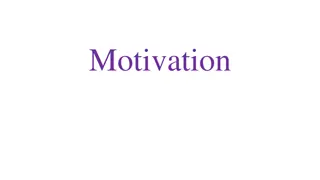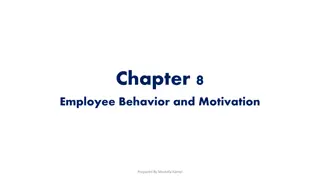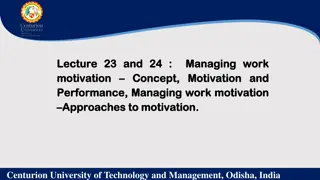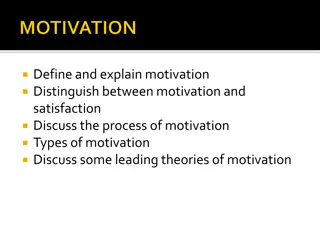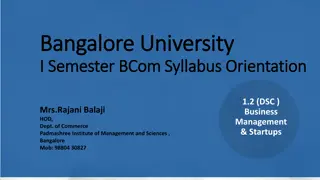the Importance of Motivation in Management
Employee motivation plays a crucial role in organizational success, influencing productivity and job satisfaction. Motivation is defined as the inner drive that directs behavior towards achieving goals. Various theories and characteristics of motivation highlight its complexity and significance in inspiring employees to perform at their best. Effective management involves understanding, promoting, and maintaining motivation among individuals to enhance overall performance.
Download Presentation

Please find below an Image/Link to download the presentation.
The content on the website is provided AS IS for your information and personal use only. It may not be sold, licensed, or shared on other websites without obtaining consent from the author.If you encounter any issues during the download, it is possible that the publisher has removed the file from their server.
You are allowed to download the files provided on this website for personal or commercial use, subject to the condition that they are used lawfully. All files are the property of their respective owners.
The content on the website is provided AS IS for your information and personal use only. It may not be sold, licensed, or shared on other websites without obtaining consent from the author.
E N D
Presentation Transcript
MOTIVATION Meaning and Definition Importance of Motivation Theories of Motivation Prepared by Dr. S. Gunakar Dept. of Commerce Pompei College, Aikala
Introduction All employees do not perform their work with equal efficiency. Difference is due to differences in their abilities or in their urge or willingness to perform as best as possible. Given the ability and skill, it is the motive of employees which determines whether they will be more or less efficient. Employee motivation is an important function of management.
Meaning and Definition : The derived from the word motive . Motive is anything that initiates or sustains activity. It is an inner state that energizes, activates or moves and that directs or channels behaviour towards goals. Motive is a psychological force within an individual, that sets him in motion. Motivation is the process of steering a person s inner drives and actions towards certain goals and committing his energies to achieve these goals. Motivation is a managerial function to encourage, induce or inspire people in an organization to perform the assigned task to the best of their abilities.
According to Dactone E. McFarland : Motivation Motivation refers refers the desires, desires, aspirations, aspirations, control control or or explain explain the According to William G. Scot : Motivation means a process of stimulating people to action, to accomplish desired goals . in which which urges, strivings, strivings, the behaviour behaviour of of human the way way in urges, drives, needs needs human beings beings . drives, direct, direct,
Characteristics of motivation 1.Motivation is an internal feeling: Motivation is a psychological phenomenon which generates within an individual. The desires of human beings are internal feelings which cannot be seen from outside. 2. Motivation produces goal oriented behaviour: Motivation is a behavioral concept that directs human behaviour towards certain goals. 3.Motivation is a continuous process: Human wants are unlimited satisfaction of one need gives way to some other need. Hence, motivation is a continuous process.
4.Motivation is complex: Human needs and motives are varied and they change from time to time. People satisfy their needs in many different ways. There is no common motivator for all individuals in the organization. 5.Person in totality, not in part is motivated: Each person is a self contained, and inseparable unit. It is not possible to motivate a certain part of the body, hence whole person is motivated. 6.Motivation may be either positive or negative: Positive motivation offers some thing precious to the person. This may be in the form of additional pay, incentives, rewards, recognition motivation emphasizes penalties while directing and controlling the performance. etc. Negative
Motivation may be financial or non financial : Motivators may be financial incentives like pay, allowances, bonus, perquisites and non financial incentives may be participation, challenging participation in management, suggestions system etc. Motives interact with environment : Needs of people are stimulated by environmental factors. Some physiological and social needs like companionship, recognition, belongingness etc. are affected by environmental factors. recognition, job, praise, workers
Importance of Motivation: Higher efficiency: Motivation is an effective instrument in the hands of management to maximize the efficiency of employees. Motivated employees give greater demotivated ones. Optimum utilization of resources: Motivation inspires employees to make best possible use of different factors of production. By motivating employee enterprise can make maximize use of its physical and financial resources. performance than
Reduction in labour turnover: Motivation results job satisfaction to employees. As a result labour absenteeism and turnover are low. Better industrial relations: Motivation will foster team spirit among workers. This will reduce labour unrest and create better management and workers. relations between Easier selection of employees: An enterprise which offers adequate financial and non financial incentives enjoys reputation in the labour market. So it can easily attract competent persons for filling various vacancies.
Facilitates change: High motivation helps to reduce resistance to change. Properly motivated employees accept and implement the changes in the organization. Motivation reduces complaints and grievances. Motivation improves organizational image. Motivation contributes for organizational effectiveness.
